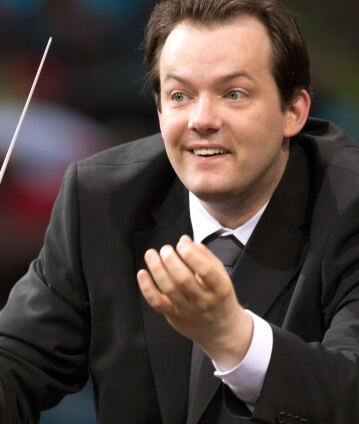Andris Nelsons conducts Tchaikovsky at the Waldbühne

Passion, tragedy and brilliance are the hallmarks of Tchaikovsky’s musical world. In this Waldbühne concert, Andris Nelsons dedicates an entire programme to the composer. In addition to two spectacular orchestral staples – the Fifth Symphony and the 1812 Overture – the programme also features three pieces with solo violin by the sensitive Tchaikovsky. The soloist is Daishin Kashimoto, first concertmaster of the orchestra.
Following his acclaimed debut in October 2010, the young Latvian conductor Andris Nelsons is here making his fourth guest appearance with the Berliner Philharmoniker, and it was a source of particular pleasure for him to be able to conduct an all-Tchaikovsky programme at the orchestra’s traditional end-of-season concert: “Tchaikovsky is one of my favourite composers, and since I am currently recording all of his symphonies with my orchestra in Birmingham, his music is very familiar to me. It is traditionally played with a lot of rubatos, animatos and ritenutos, but it is actually very Classical music that is much influenced by Mozart.”
The main work on the programme is the Fifth Symphony of 1888, a work also known in Germany and Austria as the “Schicksalssymphonie”, literally the “Symphony of Fate”, although the term is rarely used in the English-speaking world. In this particular case the composer was railing at his fate as a homosexual. At the start of his sketches for the symphony he wrote the words: “A complete resignation before fate,” and ended with the question: “Shall I cast myself into the embrace of faith?” The critic of Der Tagesspiegel was impressed by Nelsons’s “sensitivity in coaxing the finest and most pearl-like sounds from the orchestra,” while the reviewer of the Berliner Morgenpost summed up his reaction in the words: “Nelsons is like a magician bringing the notes to life, while immersing himself so deeply in the music that one wonders how he is simultaneously able to retain an overview of the work.”
There follow three works for orchestra and violin, the Sérénade mélancolique, the Valse-Scherzo and the Mélodie from Souvenir d’un lieu cher. The orchestra’s leader, Daishin Kashimoto, dazzled his audience with his warm tone and elegant playing. To accompany the cannon salvos of the final “1812” Overture there was also a genuine firework display, although, given the appalling weather, it was little short of a miracle that the fuses ignited at all. The persistent rain was also to blame for the fact that there is only a single encore: the famous Berliner Luft, a hymn to the “air of Berlin”, which on this particular occasion presents itself in its wettest conceivable manifestation – not that this detracted for a moment from the audience’s boundless enthusiasm.
© 2012 EuroArts Music International
Category
Artists
Our recommendations
- Yannick Nézet-Séguin conducts a “Czech Evening” at the Waldbühne
- A “Night of Love” with Ion Marin and Renée Fleming at the Waldbühne
- Mariss Jansons conducts music from the Austro-Hungarian Empire at the Waldbühne
- Claudio Abbado conducts an “Italian Night” at the Waldbühne
- James Levine conducts Wagner and Strauss at the Waldbühne
- Gustavo Dudamel conducts Tchaikovsky and Brahms at the Waldbühne